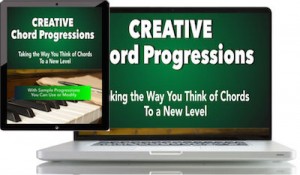How’s your musical ear? Here’s how you know that it needs some work:
- You can read music, but you find it difficult or impossible to play by ear.
- You hear a great melody, but you can’t find the notes on your instrument.
- You sit at the piano to play a song for a sing-along (like “Jingle Bells”, this time of year), but you can’t even begin to imagine what the chords should be.
- You improvise and come up with a nice melody for a song, but less than 5 minutes later, you can’t remember it.
Those are the most obvious symptoms of having a weak ear. The good news is that even though the window of opportunity to improve your ear lessens with each passing year, that window never closes completely. There is always something you can do to improve your aural skills, what we call your “ear”.
 Gary’s most recent eBook, “Hooks and Riffs: How They Grab Attention, Make Songs Memorable, and Build Your Fan Base“, is now available!
Gary’s most recent eBook, “Hooks and Riffs: How They Grab Attention, Make Songs Memorable, and Build Your Fan Base“, is now available!  It’s part of the 10-eBook Deluxe Bundle package of songwriting eBooks.
It’s part of the 10-eBook Deluxe Bundle package of songwriting eBooks.
On those days when you feel that writing songs is happening slowly, why not spend some time strengthening your aural skills. Right now, let’s concentrate on one important area: the ability to hear and recognize chords.
There are lots of ways to do this, but here is one set of steps that will help. Don’t expect this to work within minutes. It will take time and patience, but you will improve.
Start by choosing a simple, slow ballad, something that gives you more time to listen to each chord. Here are a few choices you can try. The first chords for each song are given:
- “Hey Jude” (F)
- “When I Was Your Man” (Ignore intro for now; first verse starts on Am)
- “I’m Not the Only One” (F)
Give your chosen song’s verse a few listens, and then try the following steps:
- Identify bass lines. In pop music genres, 80%-90% of chords are in root position. That means that if you can recognize the bass, you will be able to identify 80% of the chords. So put on a favourite tune, grab your guitar, bass or keyboard, and play the bass notes that you hear. As you get them right, write them down.
- Identify chord quality. The word quality refers to whether a chord is major, minor, etc. So go back to the beginning and above the bass notes you’ve written, try to identify what kind of chord you’re hearing. If you find this step difficult, try singing that part of the song, first with a major chord, then a minor. The correct choice should then be fairly easy to hear.
- Identify any chord inversions. For the 20% or so of chords that aren’t in root position, you’re dealing with an inversion (also known as a slash chord). Most of the time, pop music uses inverted chords that place the 3rd of the chord in the bass (e.g.: C/E is a C major chord with an E in the bass). So if you correctly identify a bass note as E, but you find that the E chord and Em don’t sound right, try the chord where E is the major 3rd: C. If you need more instruction regarding inversions, try this article.
As you get bass lines, chord quality and any possible inversions correct, write down the chords. Then choose a new song and start again.
As I say, this will all take time. Each time you recognize a chord and write it down, you improve.
Another great way to improve your chord recognition ability is to use online software. A site like EarBeater will give you the ear exercising you need.
Written by Gary Ewer. Follow on Twitter.
 “The Essential Secrets of Songwriting” eBook Bundle packages have been used by thousands of songwriters to polish their technique and take their music to a new and exciting level of excellence.
“The Essential Secrets of Songwriting” eBook Bundle packages have been used by thousands of songwriters to polish their technique and take their music to a new and exciting level of excellence.
Get a copy of “Creative Chord Progressions“, as part of the 10-eBook Deluxe Bundle.











If you have the ability to hear the Tonic chord of the key even
without knowing the actual key that is an asset , If you can play
by ear thats even better
Very few have perfect pitch ( being able to recognise the actual
notes of a melody) But most can take a cue from knowing the
key the singer (re you or someone else) is playing in
If you have a weak ear follow Gary’s Blog, it will improve your ability
to write Good Songs